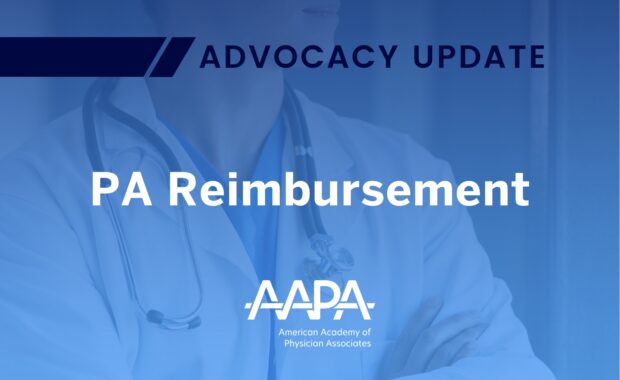CO Awards Recognize Three Organizations for Outstanding Programs
Meet the Organizations Advocating and Innovating to Move the Profession Forward
May 23, 2019
By Divya Williams
AAPA’s Outreach and Advocacy Awards are presented each year to recognize constituent organizations (COs) for their outstanding programs, projects and initiatives. The 2019 winners include the Association of PAs in Cardiothoracic and Vascular Surgery (APACVS) for expanding PA opportunities, Society of Point of Care Ultrasound (SPOCUS) for advancing the PA identity, and the Ohio Association of PAs (OAPA) for creating progressive work environments for PAs.
These are the organizations that recognized an unmet need and developed and implemented plans to fill the gaps. At AAPA 2019, these three organizations were recognized for their exemplary contributions to the profession and for paving the way for PAs to come.
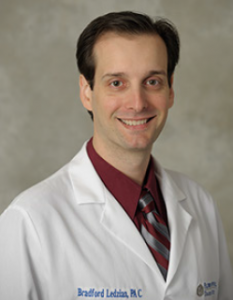
Expanding PA Opportunities
Category I was awarded to APACVS for Expanding PA Opportunities by creating a Chief Cardiothoracic and Vascular (CTV) PA Primer Course and ‘ACE’ approach to education.
The APACVS identified the lack of formal Chief CTV PA training programs and recognized that the main barrier would be hospital administrative misconceptions and biases about PA clinical administrative roles and responsibilities. “We first set out to define the CTV PA Clinical Administrator role,” shares APACVS’s Bradford Ledzian, PA-C, MHS, CCTC, DFAAPA, FAPACVS. “We did this with the belief that if we do not define ourselves, others will define us, likely using their detrimental and limiting beliefs.”
Their solution became the CTV-PA Leadership Tract Chief PA Primer Course. The goals of the three-year program were to empower Chief CTV-PAs by: a) developing the premier, specialty-focused, core fundamental leadership primer course; b) setting the standard for breadth of knowledge and scope of administrative responsibility; and, c) promoting the optimal Chief CTV PA functionality.
“The strategy that we developed and used to implement our mission and realize our vision is an approach to education we call Association Coalition Education (ACE),” Ledzian says. ACE is the strategic partnership with PA organizations, special interest groups, and caucuses that helps direct APACVS’ focus, and creates unique leadership educational opportunities for CTV PAs. “I didn’t just
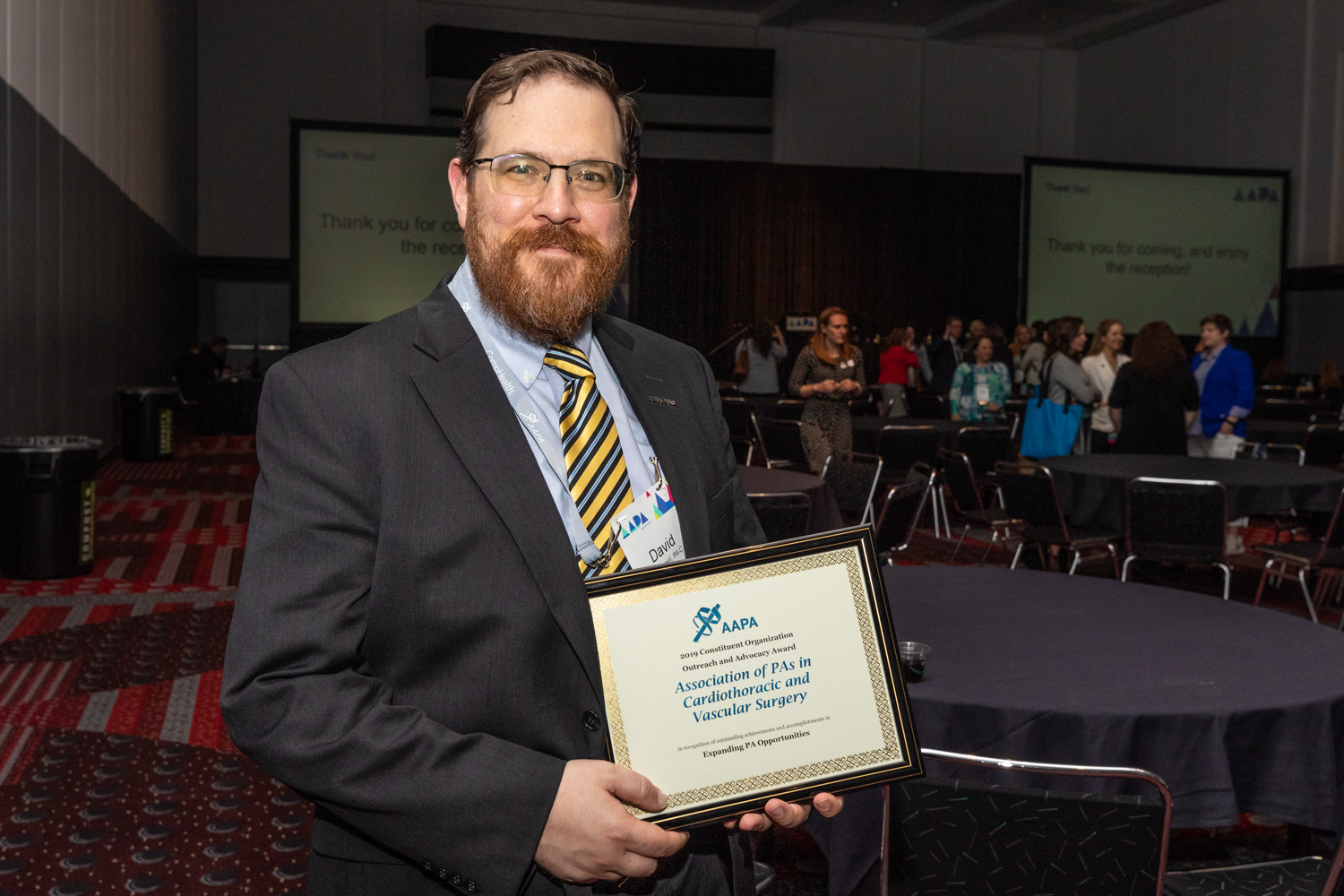
want to just put a bunch of leadership courses together,” Ledzian says. “I wanted to incorporate leaders from a bunch of organizations and work collaboratively.”
That strategy was the foundation on which they built the primer course. “Let’s say CTV-PAs have identified a need for CTV-specific Spanish language education,” Ledzian says. He notes that while a traditional approach might call for a lecture addressing this at the annual APACVS conference, the ACE approach calls for a more collaborative solution. “An APACVS leader is identified for CTV specific content expertise, a PAs for Latino Health leader is identified for Spanish and cultural content expertise, a PA Education Association leader is identified for educational delivery expertise, a CHLM leader is identified for leadership expertise, and an AAPA leader is identified for advocacy, outreach, and networking expertise.” That’s how leaders were brought in from across multiple organizations for the Chief PA Primer Course, and why the course was able to provide such a comprehensive while still focused curriculum.
Ledzian encourages use of the ACE model across other PA organizations. “We want to continue to foster and advocate inter-PA agency relationships by enhancing interaction and collaboration.”

Advancing the PA Identity
SPOCUS took home the Category II award for Advancing the PA Identity. SPOCUS developed and implemented the Yes, iScan competition for PA students. After holding the inaugural competition at AAPA 2018, SPOCUS planned a second session at AAPA 2019.
Recalling how they identified the need for such a program, SPOCUS President and Co-Founder Jonathan Monti, DSc, PA-C, RDMS, admits there was a struggle to effectively demonstrate the value of POCUS in clinical practice to PA program faculty. “Many of the PA educators we engaged were understandably wary of adding more to their already-packed curricula,” he says.
The Student Ultrasound Interest Section (SUIS), a student-led and SPOCUS-mentored extracurricular activity, was highly popular. “Within a year of our inaugural SUIS at UW MEDEX, we had so many requests from PA students to support new SUIS that we struggled to support each of them.,” Monti says. “Meanwhile, the program faculty of the programs where we held SUIS began reaching out for guidance on how to integrate POCUS education.”
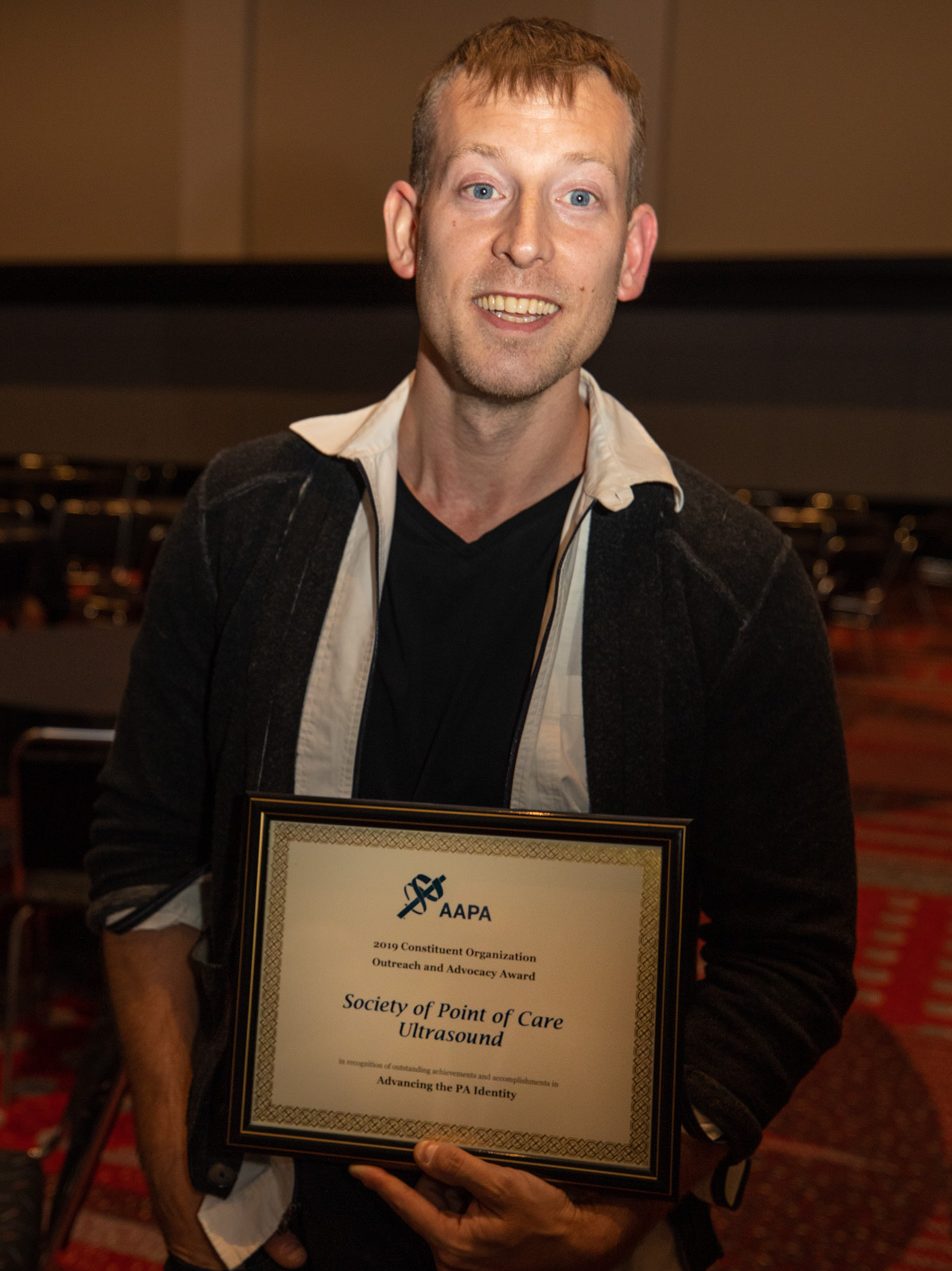
When SPOCUS leaders Francisco Norman, MPAS, PA-C and Patrick Bafuma, PA-C recognized how effective the SUIS concept was in generating student interest and influencing PA program educators, the idea for Yes, iScan was born.
“[Norman and Bafuma] looked to better leverage that student enthusiasm to expand awareness of the emerging clinical and educational value of POCUS,” Monti shares. “They envisioned the creation of a national-level event that was both fun and educational, and allowed for SPOCUS leaders to better demonstrate the power of POCUS to students, clinicians, and educators.”
Monti credited iScan Director Bafuma, along with AAPA Staff Advisor Kodi Erb, for the behind-the-scenes effort that went into making the competition in 2018 such a success. “Recruiting nearly 40 educators for any event is no easy task,” he says. “Not only were they able to achieve this, but they brought a cadre of some of the finest PA educators and POCUS experts from across the country, inspiring them to selflessly share their time and expertise for the benefit of our student participants”
In keeping with the mission to expand opportunities for students, clinicians, and educators to better recognize the value of POCUS, Monti says “the ultimate goal is to have POCUS training fully integrated into 100% of PA programs within the next 5 to 10 years and to make POCUS a core clinical competency.”
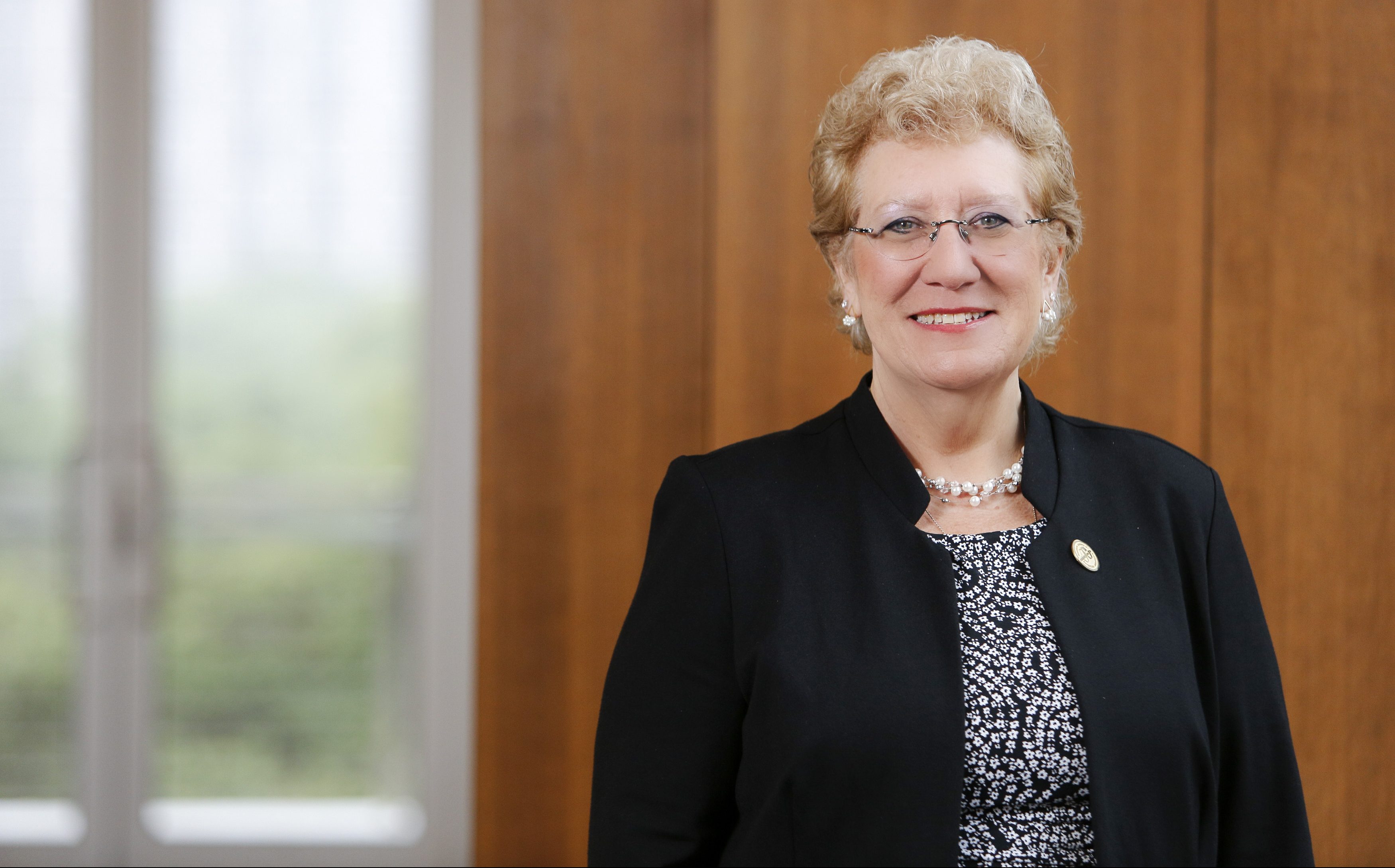
Creating Progressive Work Environments for PAs
OAPA was awarded the Category III honor for Creating Progressive Work Environments for PAs. OAPA’s Government Affairs Chair and a former President of AAPA, Josanne Pagel, MPAS, PA-C, DFAAPA, Karuna®RMT, says that out of their numerous wins, she considers no longer having to file the supervision agreements with the medical board to be the biggest win of all. “This was an enormous leap forward for Ohio PA practice. We also removed the five-day waiting period for new hire PAs,” she shares. “This immediately opened doors to jobs that otherwise would have gone to NPs due to the tedious administrative paperwork required in the past.”
Of the struggles they’ve encountered throughout the legislative processes, she notes finances as the biggest resource they were missing. “We are a poorer state, working on a shoestring budget. But we manage to get by and pass great legislation,” Pagel says, but credited the core group of PAs working hard behind the scenes for getting legislation passed. “We have a great deal of “donated hours” from this core group. If we did not have these core volunteers donating their time and efforts, we would not be able to afford the lobbyist.”
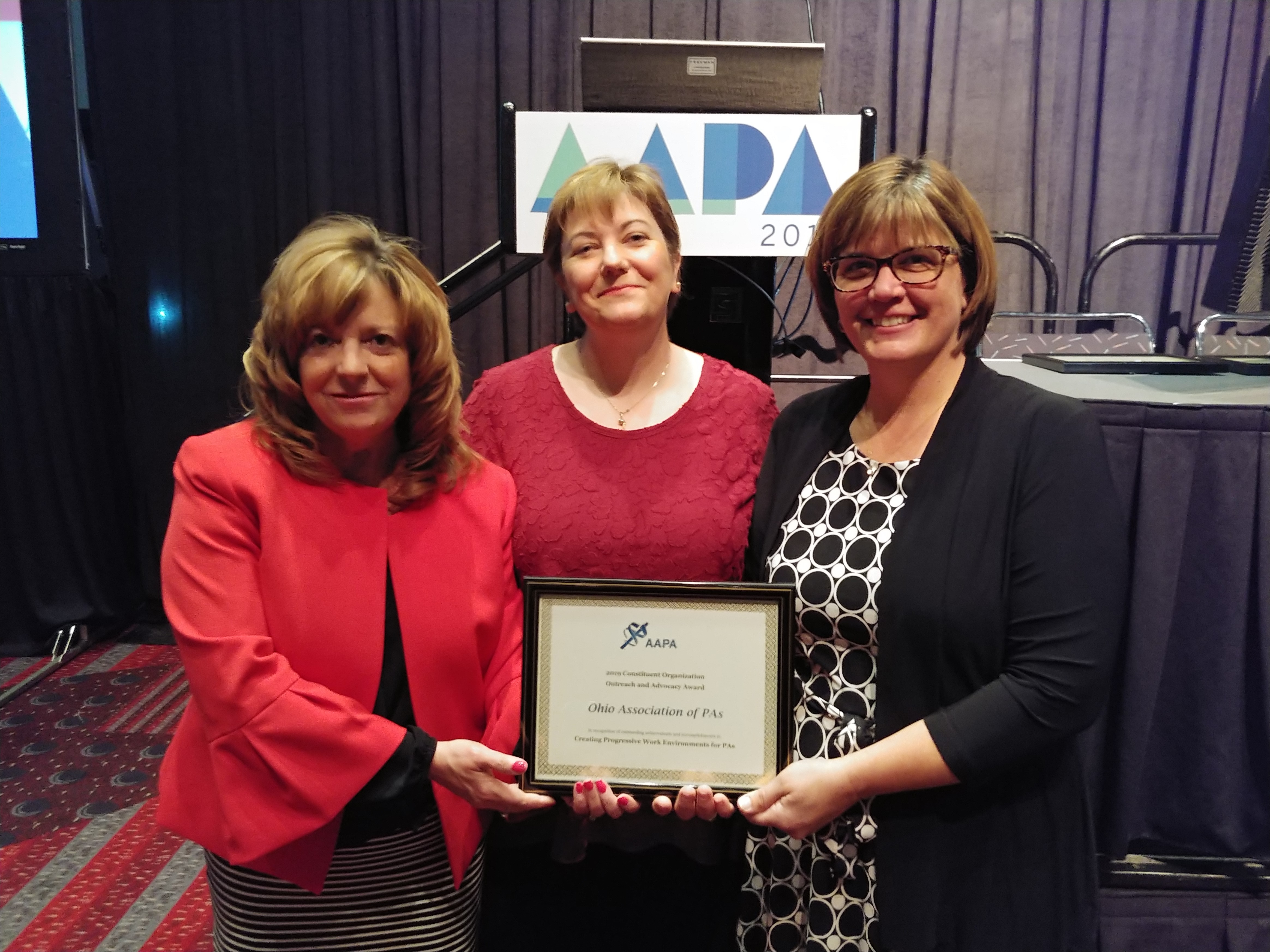
Pagel also shares that OAPA is already moving towards hopeful future legislation. “We are moving forward this year to try and remove the barrier that prevents PAs from doing sedation. We also are moving forward with introducing another bill to change the word supervision to collaboration. We also will be looking at other barriers to PA practice that are specific to Ohio law.”
For states hoping to follow a similar path, Pagel offers this advice: “Coalition-building is the most important aspect of passing any legislation. You cannot do it alone! By building coalitions, we also have gathered the respect from our physician groups.” A current struggle OAPA faces is opposition to their sedation bill, but this strategy is helping them move forward. “We are slowly winning over the physician groups by having sit-down meetings face-to-face to explain the need and the impact this bill will have on our patient population.”
Applications for the 2020 awards open October 1, 2019. COs can apply for the awards here AAPA Constituent Organization Awards.
More Resources
What is Optimal Team Practice?
Point-of-Care Ultrasound Diagnostic Tool Use on the Rise
Divya Williams is an associate in AAPA’s Communications Department. Contact her at [email protected].
Thank you for reading AAPA’s News Central
You have 2 articles left this month. Create a free account to read more stories, or become a member for more access to exclusive benefits! Already have an account? Log in.
